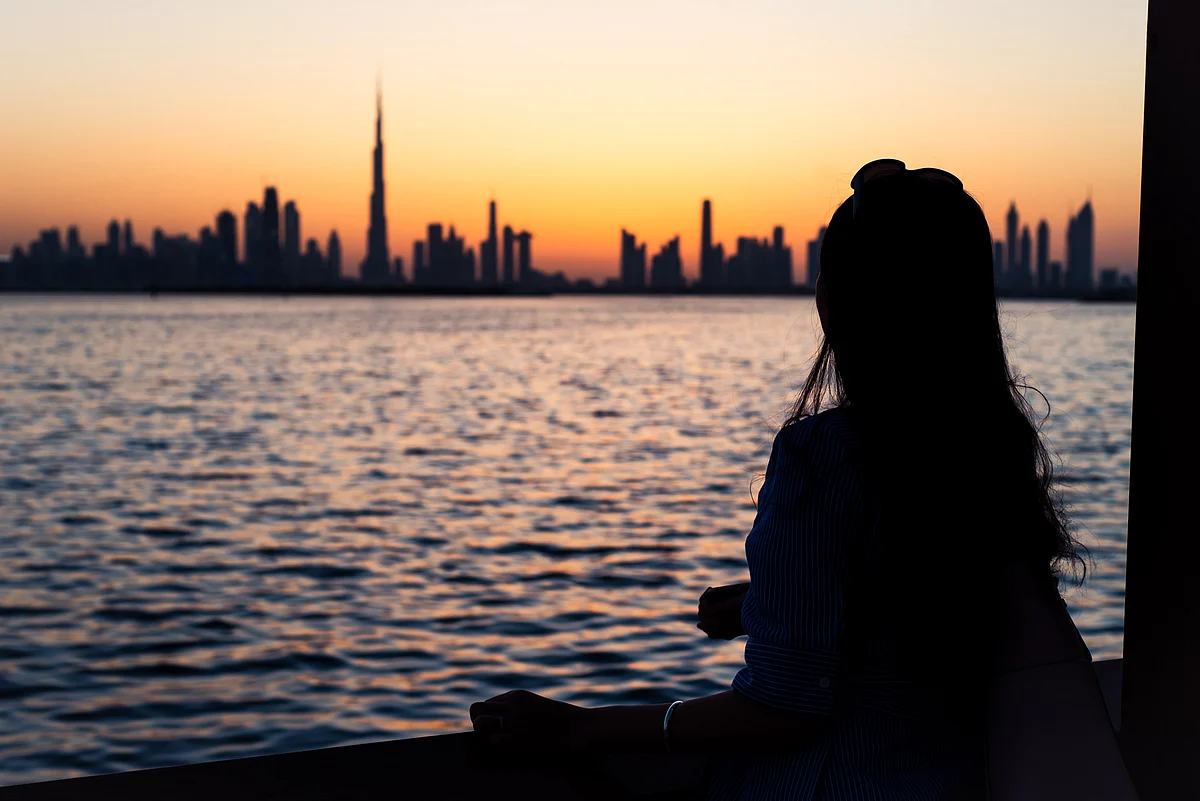“Where are you from?” they ask.
The very generic, and seemingly simple question sticks to me like static. I pause briefly, feeling the cogs start to move in my brain.
Where am I from?
Is it the place my parents were born and raised, a place I have never once resided in?
Even my Zoroastrian roots mean my diaspora identity has always contained layers, never confined to one region.
Or is it the city I spent all my years in, where Kite Beach was a ritual instead of a place, where the salt of the sea clung to my hair like smoke in the air, where sand settled in my shoes no matter where I wandered?
From the bike rides with my best friend, flying through streets full of sweat from the torrid sun, giggling as we passed the landmarks of our childhood. From the smell of freshly baked bread wafting through the rooms of my childhood home, as the posters in my bedroom remain frozen in time, reminding me of all the different versions of myself through the years.
So “Dubai”, I say as I watch the person’s face contort with confusion at my hesitance.
And suddenly, my answer begins to chip at its edges.
Even as I name the place, uncertainty tugs at my chest because the place I name does not name me back. The skyline may have grown alongside me, the sea may flow through my veins, but a document fails to show itself - like many Gulf countries, people can belong in the UAE without citizenship.
Still, I don’t feel foreign to the city, my first steps were taken on this ground, my dad taught me how to ride a bike on my neighbourhood pavement; I begged him not to let go, my mind now echoes these words to the city.
Multicultural community
But this isn’t just my heart’s tug-of-war. A massive 88.5% of the UAE’s population is made up of expats, making it one of the world’s most diverse and multicultural communities, with more than 200 nationalities living in Dubai. This leads to classrooms, beaches, parks, and homes across all 7 Emirates being full of youth growing up between multiple worlds.
For us, this means embracing many different cultural festivals and rituals, picking up on a plethora of languages, and making friends from every corner of the world (my best friends are from Kenya, Greece, Australia, Egypt, Scotland, and South Africa). Our parents moved to Dubai for work, and we found ourselves calling this place home regardless of our passports.
What we feel is not confusion, but rather a stacked identity. This is where we come to in terms of a home, even if the ink says otherwise.
It was only when I parted ways with Dubai for university last year that I started to understand how ambiguous my identity felt. In Canada, many people expect the concept of home to match with a passport or ethnicity. So when mine doesn’t, and I find myself having to explain the nature of the expatriate cultural landscape to many, this speech often feels like showing them my ID.
For expat kids in Dubai, leaving for university is more expected than not; nearly 15,000 UAE students move abroad to pursue higher education, to the UK, Canada, the United States, Australia, India and beyond. The aftermath of this isn’t always so simple.
Friendships stretched
Leaving meant that my childhood friendships have been reluctantly stretched across various time zones, and Group chats have become the replacement for daily afternoons drifting between each other’s homes, welcomed by parents who treated us all like their own children. Scheduling the next reunion turned into a blurry mess of academic calendars and planes. All of the missing becomes worth it when your screen lights up with an “I’m in Dubai, when are you free!!” text and the hugs that seem to erase all the months apart. Even then, the hushed uncertainty of when, or if, you will ever all be in the same place at the same time again, lingers.
Due to Dubai’s transient nature, with roughly 9 out of 10 residents being expatriates, not everyone makes their way back; many parents move after their children leave for university, meaning “home” may not always be waiting for your eager return in the same place. Some do make it a point to come back, but for brief periods, as their lives start shifting somewhere across oceans.
This is the inevitable fate of growing up in such a fast-paced, mutable city; being in the hands of a place that, by its essence, keeps moving too.
When I first moved to Canada, on one of my evening runs, driven by homesickness, I ran to the local park where I knew a small strip of sand near the water was located. Impulsively, I ripped off my shoes and socks, burying my feet into the sand, closing my eyes, as if it could bind me to the city inside my skin. Of course, it wasn’t the same, not even close, but for a fleeting moment, it was enough. A sliver of home.
When I got back to my dorm, there it was, the grains had followed me home, ended up scattered across my room, and in the folds of my bed sheets. I laughed to myself, the sand still clings. Stubborn as ever.
So I figured out that the real question isn’t really “where are you from”, but rather “where is home?”
For me, that will always be Dubai, not for its skyscrapers and shiny cars, but for the people, my world’s pulse, my truest roots.
Meher Vakharia was born and raised in Dubai, and is now studying in Canada.
Network Links
GN StoreDownload our app
© Al Nisr Publishing LLC 2026. All rights reserved.
